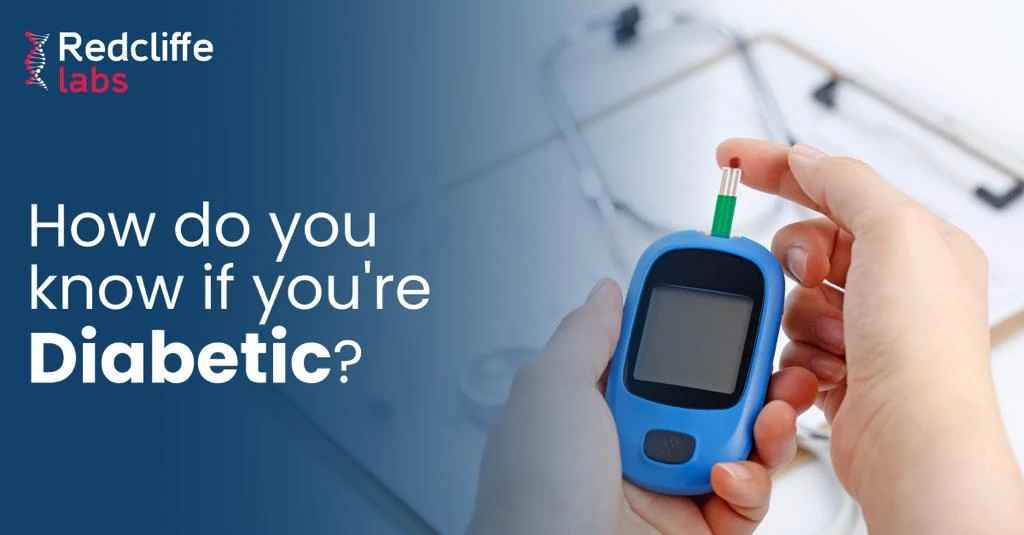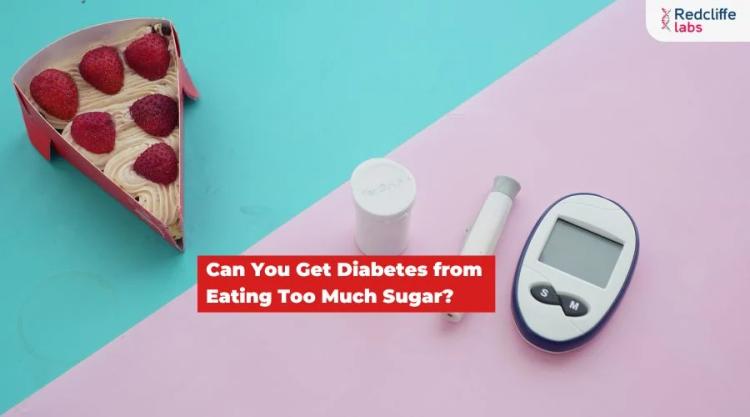How Do You Know If You're Diabetic?

Medically Reviewed By
Dr. Ragiinii Sharma
Written By Meenakshi
on May 4, 2022
Last Edit Made By Meenakshi
on Jan 23, 2025

If someone is diagnosed with diabetes, many questions may pop up in their mind and people around you start advising about what to eat or what not to eat. Whatsoever, managing diabetes is a subjective topic that needs the right routine and more awareness.
More than ever now, it is getting vital to keep diabetes under control since the pandemic is already badly impacting people's health and there seems to be no way to escape from it. It is more life-threatening for people who already have life-long illnesses, including diabetes. Therefore, to ace, the challenge of diabetes, find out more.
According to current studies, more than 500 million people are feeling the impact of diabetes worldwide today. And in the coming years, the burden of diabetes is going to rise to more than 600 million by 2030. Furthermore, 1 out of every 2 diabetic cases goes undiagnosed, and it is becoming more common day by day. Diabetes creates serious complications like strokes, heart disease, kidney failure, and much more. This can only be managed with regular physical activity, diet, and prescription medications to live a healthy and normal life.
What is Diabetes or Diabetes mellitus?
Diabetes is a disease in which the body cannot process blood glucose levels well because the pancreas doesn't produce enough insulin or the body doesn't respond well to the insulin hormone. Such a condition may give rise to high blood sugar levels all the time, which can seriously damage other body organs.
Let's understand diabetes and its three types. It comes from an organ in our body known as the pancreas, which synthesizes insulin hormones to control blood sugar levels. Too little insulin or its improper functioning may lead to prediabetes or, in more severe cases, diabetes. In such conditions, an abnormally high blood glucose level starts circulating in the blood.
There are mainly three types of diabetes known, as briefed here:
- Prediabetes
Prediabetes is the starting stage of diabetes which shows very mild symptoms. In this condition, the blood sample shows a high level of glucose but not so high as to be clinically called type 2 diabetes.
- Type 1 diabetes or insulin-dependent diabetes (IDD)
Type 1 diabetes is also known as insulin-dependent diabetes. In this type, the pancreas doesn't make insulin or makes very little insulin. Here, the cells of the pancreas stop functioning. The daily need for insulin injections is the only option for type 1 diabetes. But it only accounts for about 20% of the total cases of diabetes, and it primarily occurs during childhood or early adolescence. It develops within a short time and people tend to become sicker at the time of diagnosis.
- Type 2 diabetes or non-insulin-dependent diabetes (NIDD)
In type 2 diabetes, though there is enough insulin in the blood, the body doesn't respond well and becomes resistant to the insulin hormone. However, it can be managed with the help of diet, medication, and exercise. Type 2 diabetes affects more than 75% of the population and is mostly caused by old age. And it is one of the worst kinds of diabetes.
- Gestational Diabetes
Gestational diabetes can’t be classified as either type of diabetes. It is a temporary phase of diabetes and happens during pregnancy due to the fluctuating level of blood glucose. But it goes away once the child is born, but one still needs to pay attention to future concerns. It may be the cause of type 2 diabetes in the coming years.
How do you know if you're Diabetic?
It is really tough to diagnose diabetes because the disease doesn’t show any symptoms, or in some people, the symptoms are too mild to guess diabetes. In such cases, an experienced doctor suspects well just by looking at the symptoms and the risk factors that exist in an individual. Here we are mentioning some unusual signs or symptoms to know more about diabetes as such.
Symptoms of Diabetes Mellitus (Type 1 and Type 2 diabetes)
Both types of diabetes most of the time show almost the same symptoms during a high blood glucose level, which may include:
- Increase hunger and thirst (polydipsia)
- Drowsiness
- Increased urination or polyuria
- Nausea
- Fatigue and blurred vision
- Unintended weight loss
Symptoms of type 1 diabetes appear suddenly, while symptoms of type 2 diabetes develop slowly over time. That may include feeling mild thirst, frequent urination, dehydration, fatigue, and blurred vision, as well as feeling hypoglycemia in the initial phase. As the disease progresses, all of these symptoms become more severe.
Symptoms linked with type 1 diabetes are nausea, vomiting, abdominal pain, fatigue, rapid breathing, and a particular fruity smell that comes from the mouth during the breath. If left untreated, it may lead to ketoacidosis, a coma, and eventually death.
Risk factors Linked with Diabetes
People who are at high risk of diabetes should also get the tests done on the doctor’s recommendation. Those include:
- Obese or overweight
- More than 40 years of age
- People with an inactive lifestyle
- Suffering from any heart disease
- Have a genetic tendency to get diabetes
- Had gestational diabetes during pregnancy
- Have PCOD or PCOS (polycystic ovarian syndrome)
- Have high blood pressure
- Have unhealthy food habits
So such people should get annual screening for diabetes. If the results of the diabetes test are abnormal, a doctor may ask to repeat the tests every six months.
Screening for diabetes
It is important to check blood glucose levels for pre-diabetes also. It is especially important for older people since, at a later stage of life, the chances of developing diabetes increase. There can be a strong chance that the elderly may get type 2 diabetes without showing prominent symptoms.
Diabetes Test
If an individual is going through the specific symptoms described above, it means a doctor needs certain tests to confirm the suspected illness. A doctor may also recommend blood tests to check the blood glucose level if he finds some risk factors that could be directly linked to diabetes in an individual.
- Blood Glucose Measurement (fasting and random test)
A blood sample is taken after overnight fasting for accurate measurement or evaluation. If the test reveals a blood glucose level of more than 125 mg/dL, the person is considered diabetic and the test is known as a fasting blood test or pre-prandial blood test. When blood glucose levels are measured at any time, whether randomly or post-prandial, and blood glucose is found to be greater than 199 mg/dL, such a test also confirms diabetes..
- Hemoglobin A1c (HbA1c) Test
Hemoglobin A1c is another significant test to detect diabetes. A1c is glycosylated hemoglobin. An individual may have diabetes when its value is greater than 6.5% or equal to this. And in pre-diabetics, its values are found between 5.7 and 6.4%. The Hemoglobin A1c test is usually done every 2 months to check the average level of elevated glucose each month and is often done in people who already have diabetes.
- Glucose tolerance test
Glucose tolerance testing can also be done to screen a pregnant woman for gestational diabetes, but this test is uncommon and has several drawbacks, so it is mostly not included in routine diabetic testing.
Final Words
Well, the good side is that people who are able to maintain their blood glucose levels under control, have an active lifestyle, and prefer a healthy diet can have a longer life than normal, even with diabetes.
For more information regarding diabetes or diabetes testing, kindly contact www.redcliffelabs.com.
Disclaimer:The blog content has been posted as a piece of information and awareness only. The content provided in this blog, or in any linked materials, are not proposed and should not be taken as medical advice. Redcliffe Labs strongly recommends users to consult with their health care providers to make any medical or health-related decision.



